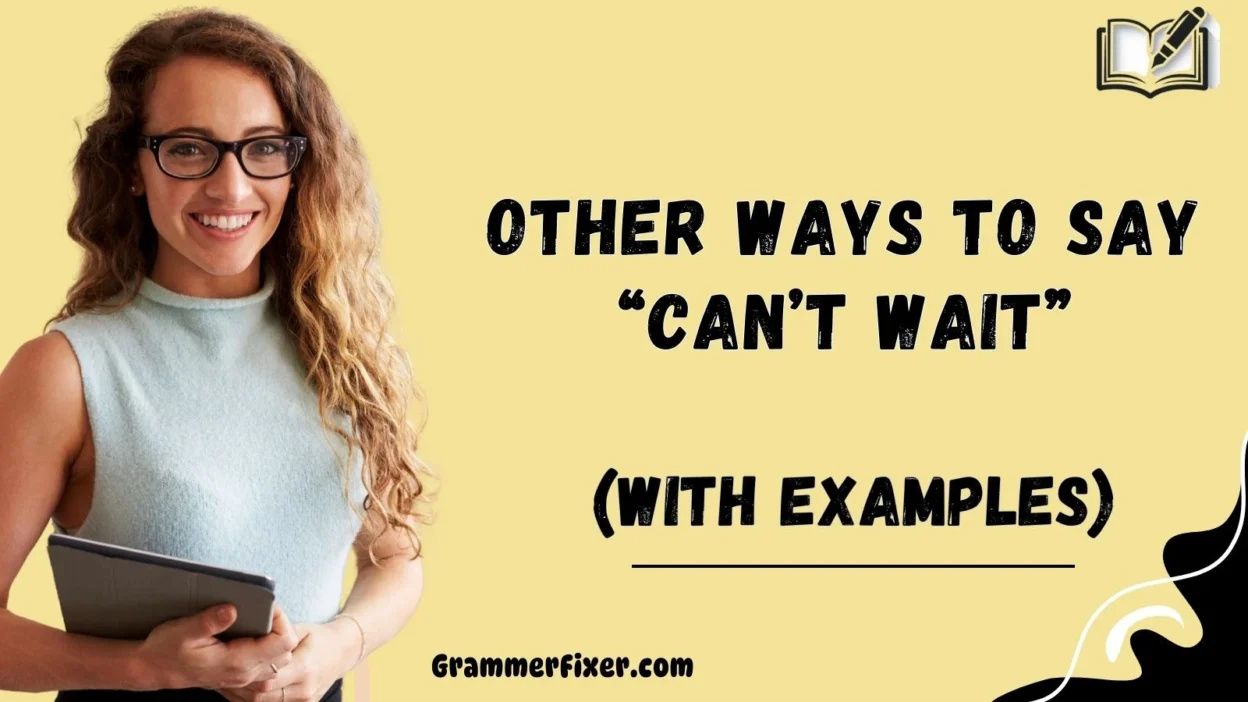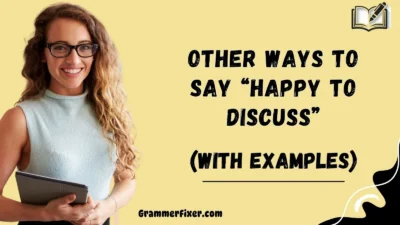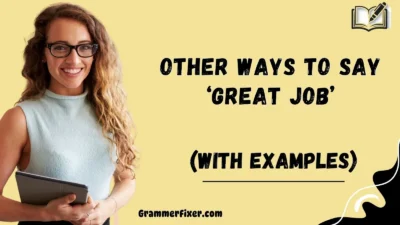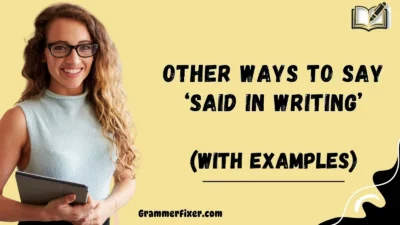Finding the right words to express excitement, warmth, and eagerness can make your communication feel personal and thoughtful. While “Can’t wait” is a popular phrase, it’s often overused, and finding meaningful alternatives can make your message feel more genuine.
Whether you’re writing to a friend, colleague, or supervisor, these alternatives offer variety, personality, and emotional depth.
Let’s explore them together.
What Does “Can’t Wait” Mean?
The phrase “Can’t wait” conveys anticipation, eagerness, and excitement about something happening in the future. It’s an informal yet heartfelt expression that indicates you’re looking forward to an event, meeting, or activity with strong positive feelings.
When to Use “Can’t Wait”?
Use “Can’t Wait” (or its alternatives) when:
- You want to show enthusiasm for an upcoming event.
- You’re expressing joy in personal conversations.
- You want to build connection by emphasizing eagerness.
- You need a friendly tone in professional or semi-professional communication.
Is It Professional/Polite to Say “Can’t Wait”?
Yes — but it depends on the context.
- In casual or friendly work environments, saying “Can’t wait” can feel warm and engaging.
- In formal professional communication, opt for refined alternatives like “I look forward to” or “I’m eager to.”
- For personal conversations, playful and energetic alternatives like “I’m so pumped” or “I’m stoked” can feel more natural.
Pros or Cons
Pros
- Conveys enthusiasm and positivity.
- Creates a personal, engaging tone.
- Helps express genuine eagerness.
Cons
- Can feel overused or repetitive.
- May sound too informal in certain professional settings.
- Risks losing impact if said too often without variation.
Alternatives to “Can’t Wait”
1. I’m Looking Forward To
Meaning: Expresses eagerness in a more professional, polite, and formal way.
Detailed Explanation: Unlike “Can’t wait,” which feels casual, “I’m looking forward to” adds warmth and professionalism, making it suitable for emails, meetings, and work-related communication.
Scenario Example:
- “I’m looking forward to our meeting on March 6, 2025.”
- “I’m looking forward to catching up with you this weekend.”
Best Use: Professional emails, semi-formal conversations, polite exchanges.
Worst Use: Very casual chats with friends where it may feel too stiff.
Tone: Polite, warm, professional.
2. I’m Excited About
Meaning: Shows genuine excitement and eagerness for something.
Detailed Explanation: This phrase directly conveys positive energy and enthusiasm. It’s versatile — appropriate in both personal and semi-professional settings.
Scenario Example:
- “I’m excited about our upcoming team project.”
- “I’m excited about the concert next month.”
Best Use: Sharing energy with friends, colleagues, or teammates.
Worst Use: Extremely formal business emails (could feel unprofessional).
Tone: Friendly, upbeat, enthusiastic.
3. I’m Thrilled
Meaning: Indicates intense excitement and joy.
Detailed Explanation: “Thrilled” emphasizes a high level of anticipation and is excellent for moments of deep emotional connection or big events.
Scenario Example:
- “I’m thrilled to be joining the new project.”
- “I’m thrilled to finally see the movie we’ve been waiting for.”
Best Use: Personal celebrations, exciting announcements, semi-formal enthusiasm.
Worst Use: Over small or routine matters (may sound exaggerated).
Tone: Intense, joyful, emotional.
4. I’m Eager To
Meaning: Reflects a keen readiness for something.
Detailed Explanation: “Eager” conveys motivation, enthusiasm, and anticipation, while still keeping a polished tone. It’s especially useful in semi-formal or professional settings.
Scenario Example:
- “I’m eager to start working on this new assignment.”
- “I’m eager to see everyone at the family reunion.”
Best Use: Emails to colleagues, new opportunities, projects.
Worst Use: Very casual situations where it may sound too formal.
Tone: Professional, motivated, polite.
5. I’m So Pumped
Meaning: A slangy, modern expression that shows high excitement.
Detailed Explanation: “Pumped” implies being energized, enthusiastic, and ready. It’s best suited for casual, upbeat conversations among friends, teammates, or social groups.
Scenario Example:
- “I’m so pumped for the weekend getaway!”
- “I’m pumped for the basketball game tonight.”
Best Use: Friends, casual chats, team activities.
Worst Use: Business emails, interviews, or serious conversations.
Tone: Casual, energetic, playful.
6. I’m Stoked
Meaning: A casual, slang expression for being extremely excited.
Detailed Explanation: “Stoked” originates from surf and skate culture but has become a widely used modern term that conveys youthful enthusiasm and energy. It’s ideal when you want your excitement to feel cool, upbeat, and laid-back.
Scenario Example:
- “I’m stoked about our road trip next week!”
- “I’m stoked to finally see my favorite band live.”
Best Use: Social chats, group texts, casual conversations, fun activities.
Worst Use: Professional communication, business contexts, or serious events.
Tone: Youthful, trendy, playful.
7. I’m Buzzing
Meaning: Shows you’re overflowing with excitement or “buzzing” with energy.
Detailed Explanation: This phrase conveys vivid anticipation and is often used in British English. It gives the sense that you’re so thrilled that you can hardly keep it in.
Scenario Example:
- “I’m buzzing about the party this Friday night.”
- “I’m buzzing to finally meet the team in person.”
Best Use: Informal conversations, fun gatherings, light-hearted workplace chats.
Worst Use: Very formal contexts or emails where slang isn’t appropriate.
Tone: Energetic, friendly, lively.
8. I’m Thrilled to Bits
Meaning: An informal British phrase that means you’re extremely happy and excited.
Detailed Explanation: “Thrilled to bits” conveys immense joy and excitement, often used for personal or social occasions. It’s a charming, slightly old-fashioned way to express delight.
Scenario Example:
- “I’m thrilled to bits about the good news.”
- “I’m thrilled to bits to see you again after so long.”
Best Use: Friendly conversations, heartfelt messages, sharing good news.
Worst Use: Professional emails where a neutral tone is preferred.
Tone: Charming, heartfelt, emotional.
9. I’m Dying to
Meaning: A dramatic phrase that emphasizes strong eagerness.
Detailed Explanation: “I’m dying to” is a figurative expression showing impatience and eagerness. It works well in casual conversations when you want to exaggerate your excitement for emphasis.
Scenario Example:
- “I’m dying to try that new restaurant with you.”
- “I’m dying to hear all about your trip!”
Best Use: Friends, casual texts, informal conversations.
Worst Use: Professional settings where it might sound unpolished.
Tone: Dramatic, casual, playful.
10. I’m Counting Down the Days
Meaning: Reflects that you’re so excited you’re keeping track of time.
Detailed Explanation: This phrase shows that the upcoming event means so much to you that you’re literally anticipating every day until it happens. It’s personal and meaningful, emphasizing long-awaited joy.
Scenario Example:
- “I’m counting down the days until our family reunion.”
- “I’m counting down the days until the concert on March 6, 2025.”
Best Use: Long-awaited events, reunions, trips, special gatherings.
Worst Use: Formal professional messages.
Tone: Heartfelt, enthusiastic, personal.
11. I’m On the Edge of My Seat
Meaning: Describes suspense and excitement, often used for events that keep you eager and unable to relax.
Detailed Explanation: This phrase paints a vivid picture of being so engaged or excited that you’re literally sitting at the edge of your chair. It’s commonly used for entertainment, sports, or suspenseful events.
Scenario Example:
- “I’m on the edge of my seat waiting for the championship game.”
- “I’m on the edge of my seat to hear your big announcement.”
Best Use: Watching games, waiting for big news, suspenseful contexts.
Worst Use: Professional business conversations where it may sound too dramatic.
Tone: Vivid, dramatic, energetic.
12. I’m Practically Bouncing Off the Walls
Meaning: Shows overflowing excitement in a playful, exaggerated way.
Detailed Explanation: This idiom communicates so much energy that you feel like you can’t sit still. It’s a fun, expressive way to emphasize anticipation.
Scenario Example:
- “I’m practically bouncing off the walls about our weekend getaway.”
- “I’m bouncing off the walls thinking about the big festival!”
Best Use: Casual conversations with friends, playful social chats.
Worst Use: Professional environments or serious discussions.
Tone: Playful, exaggerated, youthful.
13. I’m Super Excited
Meaning: A straightforward way to say you’re very excited.
Detailed Explanation: Adding “super” emphasizes enthusiasm while keeping the tone friendly and approachable. It’s one of the easiest ways to replace “Can’t wait” in everyday chats.
Scenario Example:
- “I’m super excited for the trip this weekend.”
- “I’m super excited to start this new project with the team.”
Best Use: Everyday conversations, semi-professional emails with a friendly touch.
Worst Use: Overuse may sound repetitive or less impactful.
Tone: Friendly, casual, positive.
14. I’m Hyped
Meaning: A slang word that means extremely excited and energized.
Detailed Explanation: “Hyped” comes from pop culture and youth slang, often used to show energetic anticipation. It’s best suited for casual and playful environments.
Scenario Example:
- “I’m hyped for the concert tonight.”
- “I’m hyped about our team’s big win.”
Best Use: Youthful chats, social media posts, gaming or sports contexts.
Worst Use: Professional or formal settings.
Tone: Energetic, trendy, casual.
15. I’m Beyond Thrilled
Meaning: An intensified version of “thrilled” that shows extreme happiness and eagerness.
Detailed Explanation: Adding “beyond” amplifies the excitement, making it feel heartfelt and deeply emotional. This is excellent for big life events or announcements.
Scenario Example:
- “I’m beyond thrilled to share this amazing news with you.”
- “I’m beyond thrilled about the upcoming family wedding.”
Best Use: Major personal or professional milestones, heartfelt moments.
Worst Use: Everyday casual chats (might sound too heavy for small events).
Tone: Emotional, heartfelt, refined.
16. I’m Bubbling Over with Excitement
Meaning: Suggests you’re so full of joy and anticipation that it’s hard to contain.
Detailed Explanation: This phrase paints a vivid picture of someone so excited that the feeling spills over. It’s warm, expressive, and works well in personal, heartfelt interactions.
Scenario Example:
- “I’m bubbling over with excitement about our weekend getaway.”
- “I’m bubbling over with excitement to see you after so long.”
Best Use: Personal conversations, heartfelt messages, sharing joyful news.
Worst Use: Serious, formal emails or business meetings.
Tone: Warm, expressive, heartfelt.
17. I’m Eagerly Anticipating
Meaning: A slightly formal phrase that shows readiness and eagerness.
Detailed Explanation: This alternative is polished and professional, making it ideal for contexts where you want to sound enthusiastic yet respectful.
Scenario Example:
- “I’m eagerly anticipating our collaboration on this project.”
- “I’m eagerly anticipating the upcoming conference.”
Best Use: Business emails, professional correspondence, semi-formal events.
Worst Use: Casual conversations with close friends.
Tone: Professional, polite, refined.
18. I’m Geared Up For
Meaning: Suggests you’re prepared and excited for what’s coming.
Detailed Explanation: “Geared up” combines readiness with anticipation, making it a great choice for both personal adventures and team projects.
Scenario Example:
- “I’m geared up for the team-building retreat.”
- “I’m geared up for our hiking trip this weekend.”
Best Use: Team activities, group events, casual professional chats.
Worst Use: Formal messages to supervisors or clients.
Tone: Energetic, prepared, positive.
19. I’m Fired Up
Meaning: Shows high energy and motivation about something upcoming.
Detailed Explanation: Often used in sports and motivational contexts, “fired up” expresses drive and eagerness. It works especially well in team environments.
Scenario Example:
- “I’m fired up for the big game tonight.”
- “I’m fired up about our new project launch.”
Best Use: Teamwork, sports, casual or semi-professional settings.
Worst Use: Formal communications or sensitive situations.
Tone: Motivated, energetic, passionate.
20. I’m So Ready
Meaning: Communicates confidence and readiness combined with excitement.
Detailed Explanation: Simple yet powerful, this phrase works well when you want to show you’re not just waiting — you’re prepared to dive right in.
Scenario Example:
- “I’m so ready for our weekend trip!”
- “I’m so ready to start the new semester.”
Best Use: Personal conversations, casual team settings, motivational contexts.
Worst Use: Overly formal or traditional business emails.
Tone: Confident, relaxed, positive.
21. I’m Psyched
Meaning: A casual way of saying you’re super excited.
Detailed Explanation: “Psyched” is slangy but widely understood. It conveys upbeat energy and enthusiasm, often used in personal or playful contexts.
Scenario Example:
- “I’m psyched for the concert this weekend.”
- “I’m psyched to finally meet your friends.”
Best Use: Casual chats, texts, playful social conversations.
Worst Use: Professional contexts where slang may feel unpolished.
Tone: Casual, upbeat, youthful.
22. I’m Over the Moon
Meaning: A warm, expressive idiom meaning you’re extremely happy and excited.
Detailed Explanation: This phrase conveys heartfelt joy and delight. It’s particularly effective in personal conversations or when sharing life milestones.
Scenario Example:
- “I’m over the moon about our new home.”
- “I’m over the moon to hear your wonderful news.”
Best Use: Sharing emotional, joyful news; family or friends.
Worst Use: Formal or strictly professional communication.
Tone: Warm, heartfelt, emotional.
23. I’m Jumping for Joy
Meaning: Suggests you’re so excited that you feel like physically jumping in happiness.
Detailed Explanation: A playful, visual phrase that works well for personal expressions of delight. It’s best for moments of celebration.
Scenario Example:
- “I’m jumping for joy about your promotion!”
- “I’m jumping for joy that our vacation is finally here.”
Best Use: Celebrations, personal chats, family or friend news.
Worst Use: Professional settings where exaggeration feels inappropriate.
Tone: Playful, joyful, celebratory.
24. I’m Totally Pumped Up
Meaning: A slangy, high-energy version of “excited.”
Detailed Explanation: Adding “totally” amplifies the excitement, making it sound more energetic and lively. Great for casual, upbeat settings.
Scenario Example:
- “I’m totally pumped up for the championship game!”
- “I’m totally pumped up about our weekend trip.”
Best Use: Sports, team outings, casual group chats.
Worst Use: Formal emails, business reports.
Tone: Energetic, informal, spirited.
25. I’m Raring to Go
Meaning: Indicates readiness and eagerness to start.
Detailed Explanation: A charming, slightly old-fashioned phrase that still feels energetic and positive. It communicates motivation while being friendly.
Scenario Example:
- “I’m raring to go for our morning hike.”
- “I’m raring to go on this exciting new project.”
Best Use: Casual to semi-formal conversations, upbeat contexts.
Worst Use: Very formal or serious professional situations.
Tone: Positive, charming, motivated.
26. I’m All Set
Meaning: Conveys readiness and quiet excitement.
Detailed Explanation: This phrase emphasizes being prepared and eager without sounding overly dramatic. It balances readiness with enthusiasm.
Scenario Example:
- “I’m all set for our vacation next week.”
- “I’m all set for tomorrow’s presentation.”
Best Use: Both personal and semi-professional contexts.
Worst Use: When you need to show very high emotional excitement.
Tone: Calm, confident, ready.
27. I’m Anxiously Awaiting
Meaning: Shows anticipation mixed with nervousness or eagerness.
Detailed Explanation: Unlike purely joyful alternatives, this phrase reflects mixed emotions — excitement paired with impatience or curiosity.
Scenario Example:
- “I’m anxiously awaiting the results of my interview.”
- “I’m anxiously awaiting your reply.”
Best Use: Semi-formal emails, situations with nervous energy.
Worst Use: Casual conversations where “anxious” could be misread as worry.
Tone: Thoughtful, emotional, slightly formal.
28. I’m Bursting with Excitement
Meaning: Suggests you’re so thrilled that you feel like you’ll burst if you don’t share it.
Detailed Explanation: This is a playful exaggeration often used in personal, emotional, or celebratory moments.
Scenario Example:
- “I’m bursting with excitement about the big surprise.”
- “I’m bursting with excitement to see you again.”
Best Use: Heartfelt messages, joyful reunions, celebrations.
Worst Use: Business contexts where understatement is preferred.
Tone: Joyful, emotional, playful.
29. I’m Keyed Up
Meaning: A phrase that conveys being energized and restless in anticipation.
Detailed Explanation: “Keyed up” suggests a mix of excitement, nervousness, and readiness. It’s not as common today but still conveys vivid meaning.
Scenario Example:
- “I’m keyed up for the product launch tomorrow.”
- “I’m keyed up about our family reunion this weekend.”
Best Use: Situations with suspense, anticipation, or preparation.
Worst Use: Very formal contexts (may sound outdated).
Tone: Nervous energy, excited, anticipatory.
30. I’m Revved Up
Meaning: A high-energy expression meaning you’re ready and excited.
Detailed Explanation: Borrowed from car engines “revving up,” this phrase conveys power, readiness, and enthusiasm. It’s especially fitting for energetic team activities or personal adventures.
Scenario Example:
- “I’m revved up for our marathon this weekend.”
- “I’m revved up about the new project kickoff.”
Best Use: Sports, challenges, energetic group settings.
Worst Use: Serious, formal, or sensitive communications.
Tone: Energetic, lively, motivating.
Conclusion
Finding other ways to say “Can’t wait” helps you express excitement with more personality, warmth, and depth. From professional alternatives like “I’m looking forward to” to playful ones like “I’m bouncing off the walls,” each phrase carries a unique tone, level of formality, and emotional impact.



